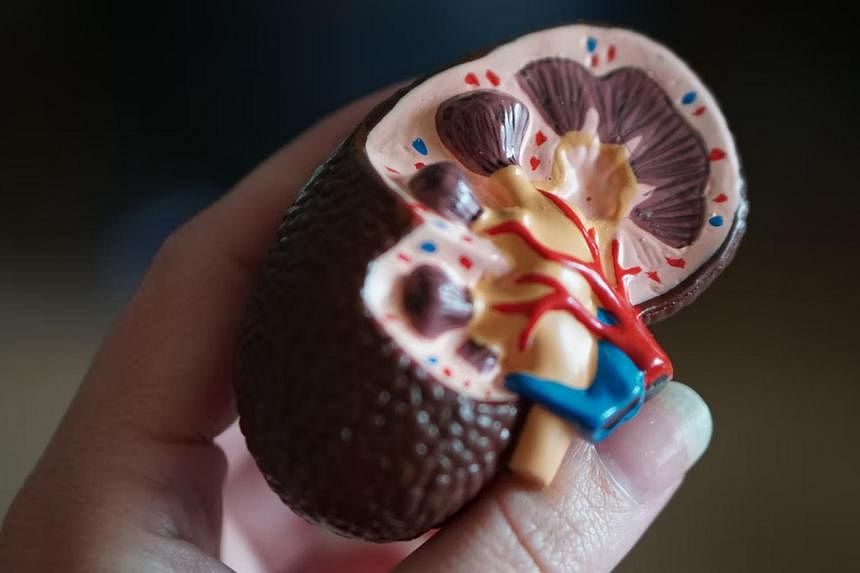SINGAPORE - The number of kidney transplants - already decreasing before the Covid-19 pandemic hit - has fallen over the past two years, even as the waiting time for a donor kidney grows longer.
In 2019, there were 33 kidney transplant operations involving deceased donors carried out in Singapore; but only 15 kidney transplants took place in 2020 and just 24 last year.
Living-donor transplants were also affected, falling from 56 in 2019 to 31 in 2020, before going up to 47 last year.
In contrast, the number of people here waiting for a kidney has steadily climbed. There were 330 people on the transplant wait list in 2019 and 371 last year. The average waiting time for a kidney from a deceased donor is now 97.4 months, or just over eight years.
Doctors said Covid-19 is to blame for the backlog, as staff were redeployed to help with pandemic operations and operations postponed, especially if the patients were deemed to be high-risk.
Associate Professor Terence Kee, who is director of the Singapore General Hospital's (SGH) renal transplant programme, said the first year of the pandemic hit especially hard.
"Even though the circuit breaker lasted only two months, more than 100 SGH patients were affected as processing of referrals and evaluations were suspended," he said.
Evaluations for living donor kidney transplants were put on hold, as was placement on the deceased-donor wait list.
"Our staff were deployed elsewhere to support Covid-19 efforts such as the isolation wards, perimeter screening and swabbing operations," said Prof Kee.
Dr Hersharan Kaur Sran from the National University Hospital's (NUH) adult kidney and pancreas transplantation programme, said her hospital's experience was much the same.
The hospital's transplant team received fewer referrals from kidney doctors, who were swamped, and transplants involving deceased donors dropped significantly due to concerns about infection transmission, among other things.
For instance, organs from higher-risk donors - such as people who were older or less healthy - were turned down, said Dr Hersharan, a senior consultant at the National University Centre for Organ Transplantation (Nucot).
This was because such transplants require more medical resources and increase the risk of recipients having to stay longer in hospital or needing intensive care.
Professor Tan Chee Kiat, who is director of the Health Ministry's National Organ Transplant Unit, said Singapore has one of the highest rates of diabetic kidney failure in the world.
About 5.7 people are diagnosed with kidney failure daily, and two in three cases of kidney failure are due to diabetes. There are more than 8,500 dialysis patients in Singapore.
For patients with end-stage disease, kidney transplants are often the best option. But even before the pandemic, the number of organs from deceased donors was already in decline, largely because they were medically unsuitable for various reasons, he said.
"On the other hand, there is an increase in the prevalence of kidney failure and hence a corresponding increase in the waiting time for a kidney transplant."
He added that the proportion of people who were put on the wait list during the pandemic, as compared with those who died or were taken off the list, remained relatively stable.
Dr Hersharan said 5 per cent to 10 per cent of the people on Nucot's wait list are removed every year as they are no longer medically suitable for transplantation, while less than 5 per cent die.
Before the pandemic, it used to add between 50 and 60 patients to the wait list each year. This dropped to between 30 and 40 yearly after Covid-19 struck.
The good news is that transplant numbers are slowly picking up, as hospitals adjust to the new normal.
Prof Kee said SGH had established a robust system of screening for Covid-19, requiring donors and recipients to self-isolate before surgery and undergo repeated tests for the virus.
This is because transplant recipients are on drugs to prevent their immune systems from rejecting the transplant, and a Covid-19 infection could prove fatal.
"In other words, we have demonstrated that the processes in place allow us to perform kidney transplantation safely even during a pandemic," he said.
As pressure from the pandemic eases off, Singapore will need to get back to business as usual for transplants, Dr Hersharan said. This means increasing referrals and accepting higher-risk donors and patients.
"Western countries have already increased transplantation rates to pre-pandemic levels," she added. "Hence, we are hopeful we can follow suit."
Mr Koh Cheun Yang, 44, has been on the kidney transplant wait list for 14 years. He has had both kidneys removed due to a condition which results in cysts forming in them, and goes for dialysis three times a week.
His doctor at NUH told him that the pandemic would impact his chances of getting a new kidney, but he remains upbeat.
"I just follow the doctors' and nurses' advice and keep positive," said Mr Koh, who works in information technology. "I've been living my life normally, so it's not a big blow to me. I've been waiting for so long already."
Kidney transplants in the last 5 years
Dead donor
2017 - 53
2018 - 38
2019 - 33
2020 - 15
2021 - 24
Living donor (Citizens and permanent residents in all hospitals)
2017 - 40
2018 - 43
2019 - 56
2020 - 31
2021 - 47


